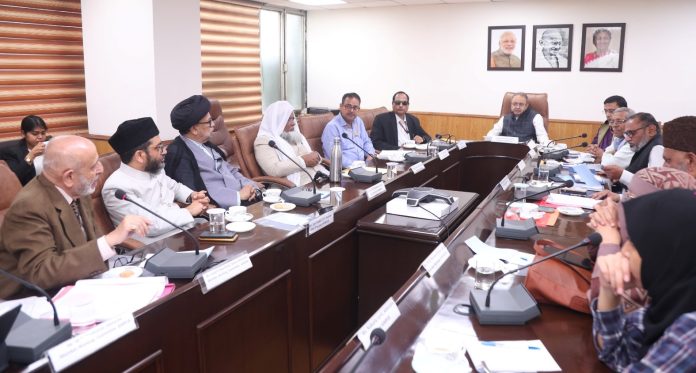New Delhi: Strongly opposing the Uniform Civil Code, the All India Muslim Personal Law Board (AIMPLB) has made clear to the Law Commission of India that even a minute change in the basic format of Sharia law is not acceptable to Muslims.
A high-level delegation of AIMPLB led by its President Maulana Khalid Saifullah Rahmani met with Law Commission Chairman Justice (Retired) Ritu Raj Awasthi on August 24, 2023. AIMPLB Vice Presidents Mr. Syed Sadatullah Husaini, President Jamaat-e-Islami Hind, and Prof. Syed Ali Mohd. Naqvi, the Board’s General Secretary Maulana Mohammed Fazlur Rahim Mujaddidi, Advocate Y.H. Muchhala, Advocate M.R. Shamshad, Dr. Mufti Mohd. Mukarram Ahmad, Shahi Imam, Masjid Fatehpuri; Maulana Asghar Ali Imam Mehdi Salafi, President Markazi Jamiat Ahle Hadith Hind; Prof. Monisa Bushra Abidi, Advocate Nabeela Jameel, and the Board’s spokesperson Dr. S.Q.R. Ilyas, were part of the delegation.
After the introduction, Justice Awasthi invited the delegation to express its views on UCC and other Muslim Personal Law related issues.
Explaining to Justice Awasthi why UCC is unacceptable to Muslims, Maulana Rahmani elaborated that the Sharia Law, or the Muslim Personal Law, has two components, one is based on the Qur’ān and Sunnah (Prophet’s words and actions) and the other is Ijtihad (Islamic scholars’ opinions). Stating that the first part of it is unalterable, and even Muslim scholars cannot make any change in it, he said that Ijtihad could differ with time and situations.
The delegation has raised several questions including whether the Commission has undertaken any survey or has any data on the basis of which it is proposing UCC, and why only Muslims have not been exempted from UCC when the government is ready to exclude tribals and Christians of North-eastern states from it?
When the delegation asked the Commission whether it had some specific issues related to Muslim Personal Laws, the Law Commission sought the AIMPLB’s position on nikah-e-halala, muta marriage, the minimum age for marriage in Islam and gender justice.
Explaining its position on the issues, the delegation replied, “There is no such specific age prescribed for marriage and if both husband and wife are in a position to fulfil the obligations of marriage, they can marry.”
On Nikah-e-halala, Dr S.Q.R Ilyas, spokesperson of the Board, explained, “The Shariat totally forbids a pre-planned Nikah-e-halala with someone and then divorce with the intention to get married again.” On Muta marriage, Dr. Ilyas said they were opposed to any such marriage.
According to the delegation, the Chairman of the Law Commission has assured the delegation that it is not going to suggest any substantial change that may alter the basic features of Sharia Law. “Its role is just to make suggestions and it is for the government to finalise the bill,” Justice Awasthi added.



